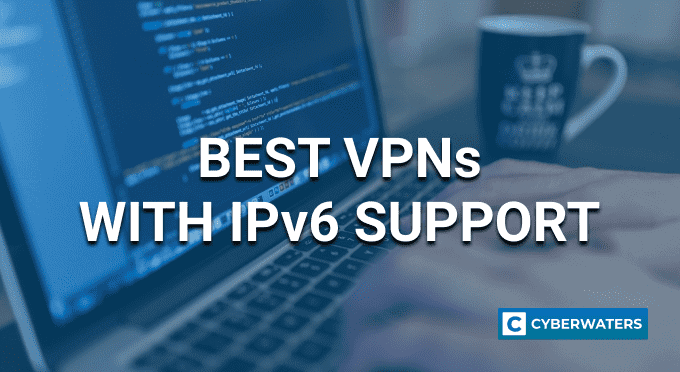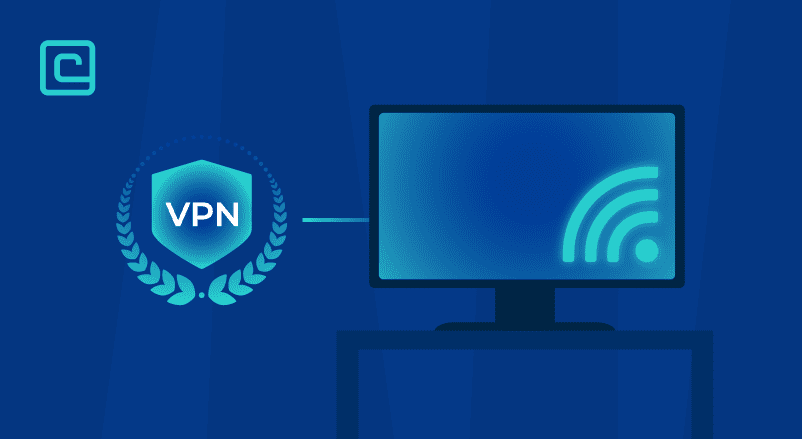3 Best VPNs with IPv6 Support (Only These Few Fully Work)

- IPv6 is a new Internet Protocol version built to solve the shortage of IPv4 addresses.
- Operational costs and slow adoption of the new IP address system mean not many VPN services currently support IPv6 in full.
- Most VPNs nowadays choose to outright block IPv6 Internet traffic to prevent leaks.
- Choose a dedicated IPv6 VPN like Perfect Privacy that actually works on IPv6-only networks (e.g. T-Mobile in the US).
VPN providers focus on security and privacy. They try to protect from any IP leaks, including IPv6. The internet is slowly moving towards the new protocol adoption, but not that many VPNs support it. There are only a few VPNs that work with IPv6. In this article, we’ll cover what IPv6 is, how to test for leaks, and list some of the best IPv6 VPN solutions available.
The Best VPN that supports IPv6 is Perfect Privacy
Do not need IPv6 and looking for a better VPN?
What is IPv6?
When the Internet started, it was small. Only a few devices were connected, each with a unique IP address.
Today, over 20 billion devices are online. IPv4 addresses can’t keep up. That’s why IPv6 was created.
IPv6 is a new version of IPv4. It has 128-bit length and can have up to 3.4×10³⁸ unique IP addresses. This is more than enough for every device.
The Internet of Things (IoT) and many mobile devices use IPv6. But switching to IPv6 is slow and expensive because it’s not backward compatible.
Why Do VPN Providers Not Support IPv6?
Some ISPs give you both IPv4 and IPv6 addresses. But, many VPN providers don’t support IPv6 for technical and economic reasons. They just block it instead.
Setting up VPN servers to use both IPv4 and IPv6 is possible. But, making IPv6 secure is hard. You need to prevent IP and DNS leaks.
Handling special cases, like when you switch servers, is crucial for privacy. Even a short time without VPN can leave your data exposed.
There’s also an economic reason to block IPv6. Since the Internet mostly uses IPv4, supporting IPv6 seems wasteful.
VPN companies focus on marketing over solving tech problems. Supporting IPv6 doesn’t seem valuable to them.
Does VPN Work with IPv6?
Some VPN services support IPv6, but they’re rare.
This is bad because some US mobile networks, like T-Mobile, only use IPv6. You can’t use a VPN without IPv6 support on these networks.
Some websites and hosting providers only work with IPv6. Luckily, there aren’t many. Almost all websites work with both versions. But, only a VPN with IPv6 support can access these sites.
So, which VPN supports IPv6?
Best VPNs with IPv6 Support – our detailed list:
1. Perfect Privacy

| 🌐 Website: | perfect-privacy.com |
| 🏢 Headquarters: | Switzerland |
| 📍Servers/Countries: | Servers 24 countries |
| ₿ Accepts Cryptocurrency | Yes |
| 💸 Deals & Coupons | Get 23% OFF |
Perfect Privacy is a top VPN for IPv6. It focuses on privacy and has servers in 25 countries. All servers use RAM-disk to protect your data.
This VPN offers great security with OpenVPN, IPSec, and SSH2. It also has DNS and IP leak protection and an Internet kill switch.
Perfect Privacy allows multi-hop connections for extra security. You can connect up to 4 server locations together.
It also has a Stealth VPN option to hide your traffic. This makes it hard for DPI and other systems to detect you.
Perfect Privacy blocks ads, malware, and trackers with TrackStop. It’s fast and unlimited for P2P and torrenting.
However, it’s not good for unblocking Netflix or other streaming services. Most sites block VPN IP addresses, and this provider is no exception.
But, it works well on our IPv6-only network. We could access many blocked and censored websites.
The VPN app is available for Windows, macOS, and Android. They should add support for more devices soon.
All plans come with a 7-day money-back guarantee.
Pros
- No-logs policy and RAM-disk servers
- Supports P2P and torrenting
- Allows port forwarding
- Blocks ads and malware
- Supports IPv6 addresses
- Stealth VPN feature
Cons
- Only 7-day money-back guarantee
- Relatively expensive
- No iOS or Linux apps
2. AzireVPN

| 🌐 Website: | azirevpn.com |
| 🏢 Headquarters: | Sweeden |
| 📍Servers/Countries: | 78 servers in 24 locations |
| ₿ Accepts Cryptocurrency | Yes |
| 💸 Deals & Coupons | Does Not offer Any Deals – Check Out This VPN |
AzireVPN is a Swedish VPN provider with full IPv6 support. It doesn’t keep any logs and uses RAM-disk servers.
Its servers are self-managed and don’t involve data centers or third parties. This adds extra privacy.
AzireVPN is fast and secure with WireGuard. It also supports OpenVPN and SOCKS5.
Torrenting is allowed on all servers in 14 countries. They have 22 server locations worldwide.
They recently added support for mobile operating systems. AzireVPN only ran on desktop devices until recently.
AzireVPN is a great choice for those who value privacy. It’s affordable and has a 7-day money-back guarantee.
Pros
- Great privacy
- Does not keep any logs
- Allows and handles IPv6 traffic
- Great for torrenting
- Advanced security and protocols
- Affordable
Cons
- Small server network
- Does not unblock streaming services
- Lots of manual set up
3. AirVPN
AirVPN is a VPN that allows IPv6 traffic. It’s run by privacy activists and uses open-source code.
It has a large server network with around 250 servers in 23 countries.
AirVPN supports OpenVPN and WireGuard in their apps. These protocols are known for their strong security.
It has dual-stack servers for torrenting. There are no IP or DNS leaks, and their apps include an Internet kill switch.
AirVPN has no speed, bandwidth, or data limits. It allows 5 simultaneous connections. It provides apps for Windows, Linux, Mac, Linux, iOS, and more.
AirVPN is transparent. You can check real-time server stats and technical specs on their website.
It’s one of the few providers with port-forwarding and many tech-features.
AirVPN offers many plans, from 3 days to 3 years.
Their plans come with a 30-day refund policy. However, their Terms of Service require written refund requests.
Pros
- Lots of advanced features
- Flexible pricing
- Good speeds
- Open source apps
- No logs policy
Cons
- Not so many servers
- Complex and unintuitive apps
- No iOS app
- Does not unblock streaming services
Do I Need VPN with IPv6 Support?
It depends on your needs.
For secure use on T-Mobile networks, you need an IPv6 VPN. This is because T-Mobile has switched to the new Internet protocol version.
Wikipedia blocks T-Mobile IP addresses due to abuse. This is because of how T-Mobile sets up their IPv6 servers.
T-Mobile’s IPv6 servers change the IP on mobile phones with every restart. This makes it hard to tell regular users from vandals.
An IPv6 VPN helps you get IP addresses not blocked by Wikipedia.
Should I Disable IPv6 if I Use VPN?
Disabling IPv6 can prevent leaks. You can do this in system settings on Windows.
But, you don’t need to disable IPv6 to stay safe. Just use a VPN that supports IPv6, and you’re set.
Disabling IPv6 is mainly for manual VPN connections. This includes IKEv2 or OpenVPN.
Or, you can use NordVPN. It blocks IPv6 traffic and has strong security features. These include Threat Protection against malicious ads and malware.
NordVPN is working on adding IPv6 support.
Should I Enable IPv6 on My Router?
Your ISP likely supports IPv6, especially with a modern router. If you’re using an IPV6 VPN, ask your ISP to enable IPv6 on your network.
Modern hardware usually has IPv6 enabled by default. If not, enabling it is just a few clicks away.
Your router might enter auto-configuration mode for a few minutes. It will then reboot with IPv6 support.
Some routers need extra steps. You can find these on the manufacturer’s website.
How to Prevent IPv6 VPN Leaks
VPNs that don’t support IPv6 block the whole Internet protocol stack. This happens every time you connect to a VPN.
NordVPN is a popular service that blocks IPv6 traffic. It sets your address to fd00::1, a local network address that can’t be leaked.
VPNs that support IPv6 face many technical challenges. They must prevent leaks when reconnecting to another server.
DNS queries also need to be handled. If VPN apps are set up wrong, they can leak your DNS requests.
To avoid IPv6 leaks, use a VPN that handles all scenarios. An internet kill switch is crucial for protection.
Disabling IPv6 in your OS settings is optional. It ensures your device only uses IPv4 addresses.
Worried about exposing your online traffic? There’s a simple test to check for leaks.
How to Test for IPv6 Leaks
Testing for IPv6 leaks is key, whether your VPN supports IPv6 or not. The easiest way is to visit the IPleak.net website.
Here’s how you should test for VPN IPv6 leaks:
- Connect to a VPN server.
- Visit the IPleak.net website.
- Wait until all automatic tests pass.
- Check the results for IP and DNS leaks.
If your VPN doesn’t support IPv6, the test should show an unreachable IPv6 address.
If your VPN does support IPv6, both IP addresses should be different before and after connecting.
For a more advanced test, use packet sniffers like Wireshark. But, you need a lot of networking knowledge.
What to Do If My IPv6 Is Leaking?
First, see if the problem persists on different devices or servers. If it does, contact customer support.
In the meantime, disable IPv6 on your device. Or use a VPN that doesn’t leak IPv4 or IPv6 addresses.
Check out our list of best VPNs that block IPv6 traffic.
IPv6 VPN FAQ
We answer common questions about IPv4 and IPv6.
What’s the Difference Between Each Internet Protocol Version?
IPv4 and IPv6 addresses differ mainly in length and format. Here’s how they look:
- IPv4 – 192.158.1.38
- IPv6 – 2001:db8:3333:4444:5555:6666:7777:8888
IPv6 addresses are longer and can use both numbers and letters. This gives more options for the billions of devices online today.
What Are the Advantages of IPv6?
IPv6 has several benefits:
- More IP addresses to go around – needed for billions of devices made every year
- Efficient routing thanks to smaller routing tables
- Bandwidth conservation from auto-configuration in devices
- Better for mobile devices – keeps the same IP address across regions.
IPv4 vs IPv6 – Which IP Addresses Are Faster?
Facebook and Apple engineers found IPv6 can be faster. Yet, other studies say there’s no big speed difference.
IPv4 and IPv6 will keep working together until devices are built for IPv6 only.
Does ExpressVPN Work with IPv6?
No, ExpressVPN doesn’t support IPv6. ExpressVPN blocks IPv6 traffic.
As IPv6 use grows, ExpressVPN might start supporting both IPv4 and IPv6.
Does CyberGhost VPN Support IPv6?
Unfortunately, CyberGhost VPN doesn’t support IPv6 yet. But, their service is leak-proof, so your IPv6 address is safe.
Does OpenVPN Support IPv6?
Yes, OpenVPN supports IPv6 in encrypted tunnels since version 2.3.0. But, not all VPN clients with OpenVPN support IPv6.
Conclusion
Many VPNs block IPv6 instead of supporting it. There’s little reason for top VPNs to support IPv6 yet.
The best VPN for IPv6 is Perfect Privacy. They offer servers in 25 countries, multi-hop connections, and obfuscation. Their network is on RAM-disk servers for extra security.
VPN Expert


